"Stephen King's first book, Carrie, was rejected thirty times. Walt Disney was fired from the Kansas City Star in 1919 because he "lacked imagination and had no good ideas.' Oprah Winfrey was fired as an evening news reporter for Baltimore's WJZ-TV because she couldn't separate her emotions from her stories. Steve Job was fired from the company he started, Apple, but was desperately brought back in to save in 1997."
Get Started for FREE
Sign up with Facebook Sign up with X
I don't have a Facebook or a X account

 Your new post is loading... Your new post is loading...
 Your new post is loading... Your new post is loading...
With nearly 200 free software applications, this new update is just jammed full of awesome free tools and tons of insights into how to use them in your courses and classrooms! If you’ve followed EmergingEdTech for a few years now,
Beth Dichter's insight:
Emerging EdTech has just released their newest version of the excellent e-book that covers free software applications. This version is free to download and it may become a great resource for you to check out when you are considering new projects to do with your learners. The e-book has eighteen chapters, beginning with Blogs and Blogging Resources. Additional chapters include: * Creating Your Own Comics and Cartoons for Teaching and Learning * Educational Games and Gamification * Interactive Collaboration Tools * Open Educational Resources * Screencasting * Using YouTube Videos as Lesson Materials * Video Conferencing and Video Chat Tools And this is by no means a complete list. You will find many more tools if you download the free book. You will need to provide your name and email address to receive the download link. Click through to the post for additional information. 
Mel Riddile's curator insight,
May 13, 2015 9:10 AM
Beth Dichter's insight: Emerging EdTech has just released their newest version of the excellent e-book that covers free software applications. This version is free to download and it may become a great resource for you to check out when you are considering new projects to do with your learners. The e-book has eighteen chapters, beginning with Blogs and Blogging Resources. Additional chapters include: * Creating Your Own Comics and Cartoons for Teaching and Learning * Educational Games and Gamification * Interactive Collaboration Tools * Open Educational Resources * Screencasting * Using YouTube Videos as Lesson Materials * Video Conferencing and Video Chat Tools And this is by no means a complete list. You will find many more tools if you download the free book. You will need to provide your name and email address to receive the download link. Click through to the post for additional information. 
Ellen Dougherty's curator insight,
August 1, 2015 11:52 AM
Emerging EdTech has just released their newest version of the excellent e-book that covers free software applications. This version is free to download and it may become a great resource for you to check out when you are considering new projects to do with your learners. The e-book has eighteen chapters, beginning with Blogs and Blogging Resources. Additional chapters include: * Creating Your Own Comics and Cartoons for Teaching and Learning * Educational Games and Gamification * Interactive Collaboration Tools * Open Educational Resources * Screencasting * Using YouTube Videos as Lesson Materials * Video Conferencing and Video Chat Tools And this is by no means a complete list. You will find many more tools if you download the free book. You will need to provide your name and email address to receive the download link. Click through to the post for additional information.
From
www
A curated list of resources to help students find high-quality, copyright friendly media for use in projects or presentations.
Beth Dichter's insight:
Are you looking for resources that provide "copyright friendly" images, audio and video for your learners? This post, by Richard Byrne, provides six resources. Each one provides access to materials that are in the public domain. * The Moving Image Archive. This is part of the Internet Archive and includes over 1.7 million clips. * The Public Domain Review is a project of the Open Knowledge Foundation and provides access to images, books, films, audio recording and essays. * The Free Music Archive (FMA) provides access to free music. This collection is curated and provides a range of genres. * Sound Gator provides free sound effects. Do you need the sound of a horn honking, or whipped cream coming out of a can? This is a great place to go. * Pixabay and the Morgue File are both great places to search for images. The Morgue File is a collection of photos, and Pixabay provides high-resolution images in the public domain. Byrne provides additional details on each of these six resources in the post. Click through to learn more.
"We live in a high tech world—with high tech classrooms. We embrace the benefits of using iPads during class, integrating tweets during presentations, and teaching students while using smart TVs. We know the many benefits of incorporating technology while teaching, such as adding diversity to lessons, increasing student interaction, and to bringing new perspectives and knowledge to the class. But there can be a negative side resulting from inappropriate or overuse of technology, and that negative side can have serious and long-term consequences."
Beth Dichter's insight:
Technology has many benefits, but it can also cause harm. Edudemic shares updated information on some of the harmful effects technology may bring, as well as five ways you may address the harmful impacts. Two of the harmful effects are below. 1. Technology changes the way children think. Research shows that "the use of technology can alter the actual wiring of the brain." There may be benefits to this, but there are some known issues that are discussed in the post. 2. Technology changes the way children feel. A study of two groups of 6th graders showed that those who "no access to technology for five days" were more empathetic than those who were using it. Studies also show that children who use technology more than 4 hours a day may experiences difficulties in "social skills and emotional reactions." In addition to two additional negative impacts the five suggestions include: * Teach responsible usage. * Use classroom technology intentionally. These are issues that are impacted by how students use technology outside of school. You may want to include some of this information in a parent newsletter. 
Daniela Tabares Restrepo's curator insight,
March 8, 2018 11:23 PM
This is an important text since we have to know that the use of technology has many benefits for the learning processes, and nowadays it has become a trend having one or more technological devices. The point is that an excessive use could have some negative points. For example, many years ago kids had a lot of interaction with their friends face to face, either playing or doing another things, but it have changed a lot since the excessive use of technology has caused that now kids do not want to get out for sharing time with their friends, they only want to be in Social Networks. Also, as it is mentioned in the text "Technology can put privacy and safety at risk"; it is true since many people, not only kids, share in their social Networks about private things that other people should not know. In conclusion, it is important to take into account the good aspects of implementing technology for education, but teachers should make their students conscious of the problems that excessive use of it can brings..
Julián David Cano's curator insight,
March 20, 2018 7:32 PM
As I already have reflected in the other articles that I have published, there is not any doubt about the important role that technology can have in education . Technology offers us millions of reasons to contribute positively in the learning process, and there are infinite resources, applications and web pages that help in our profession.
As technology has become a daily tool, it has advantages and disadvantages. It is important to take a look to this article due to the fact that ir presents four negative aspects of technology. Children are losing the ability to interact face to face with others because they only want to be focused on their digital devices. In addition, as the author says: "Technology can put privacy and safety at risk". It can be evidenced because many people are using social networks in a deliberate way without paying attention to the risks of exposing the privacy to everybody. Those are examples described in the article about the negative aspects that can arise from the bad use of technology.
"Preparing students for successful careers is a major part of every educator's job, but most preservice and professional development programmes don't cover the skills employers are currently seeking - things like 'emergent' leadership, adaptability, humility and ownership." Illustration above by Linda Tieu.
Beth Dichter's insight:
We so often hear of the 21st century skills our learners need? Common Core tells us that learners need to be critical thinkers/problem solvers, communicators, collaborators and creators. What skills are employers looking for? More than just the four Cs. This post by InformEd provides background based on what employers say they need as well as 30 tips to teach soft skills. Four tips (quoted) are below. * Demonstrate alternate paths to content mastery. * Start grading students on how well they listen to their peers. * Assign group exercises that give people the opportunity to speak, listen, write, organize and lead. * Design opportunities for students to build and demonstrate resilience. There are many more tips in this post. Click through to learn more.
As instructional designers, you have to create courses that are easy to remember and difficult to forget. Here's how:
Beth Dichter's insight:
When we think of ways to boost knowledge retention in our learners, what works for students that are online also works for students in face2face classes. This post from SH!FT provides seven ways to help student retain knowledge. The visual above illustrates the concepts. The post provides additional information as well as links to #1 - When possible, use diagrams. Many people are visual learners. Consider using graphic organizers to provide "holistic views, expressing relationships, and identifying contrasting data." #2 - Incorporate unique and out-of-the ordinary images. Why? Images stay with us longer, and the more unique, the longer they tend to stay with us. #3 - Dish out sensory details. The more details that engage the learner the better. #4 - Use color therapy. Color works on many levels. Color can be used to organize, to grab our attention, and it can impact our mood. The last 3 suggestions are below...but you will need to click through to the post to learn more about each. #5 - Exaggerate. #6 - Small bites, at one's own pace. #7 - Spaced repetition.
"Screencasting, or capturing what you do on your computer (or tablet) in a video format while you narrate your actions, is one of the most powerful functions that modern computer technology has delivered to today’s educators."
Beth Dichter's insight:
EmergingEdTech has been running a Try-a-Tool-a-Week Challenge and this week Screencast-O-Matic is the tool of the week. If you have not used this tool and are interested in doing screencasting (also known as screen capture) take the time to review this video. The free version allows you to record up to 15 minutes, but you cannot edit the film. There is a paid version for $15 per year, which allows for editing and unlimited length! Screencast-O-Matic may be used as a web app, or you can download it (PC and Mac). 
Tony Guzman's curator insight,
April 24, 2015 9:39 AM
This article includes a video tutorial on Screencast-o-matic, a video capture tool that can help you create videos for your students to help them in their learning.
"Wonder is a research engine fueled by experts. Explore results contributed by real people, and let our research network filter for you. It's like scanning the bookshelves of people you admire, and having a librarian help you."
Beth Dichter's insight:
Check out this new search engine called Wonder. Wonder is a 'human-centric' search engine. People who are knowledgeable in the field recommend resources. In fact, if you have a special area you need researched you may enter a 'ticket' explaining what you are looking for and researchers will "email you back high quality resources ASAP." The search engine is free to use, but you must create a log-in (three choices available). Once you enter your search terms items will appear with a small visual and some text. You may choose to save any item (and like or share an item). You may also request additional information (see note above) and the list of contributors is viewable allowing you to filter results by reviewer. There are so many websites that students find that are not the best. This search engine would be great for students still learning how to search, or as a way to potentially see if the sites they find are also listed by Wonder. Take some time to explore and consider sharing this with students (I would suggest high school, and possibly middle school).
"Here's what most of us know about creativity: We know that you aren't born with it, and that it can be learned; we know that people can be at their most in group setting; we know that the expression of creativity isn't exclusive to the arts; and we know that you shouldn't wait around for inspiration to strike. But do we know that rewarding creative behaviour can stunt motivation? Do we know the creative brain depends on content just as much as it depends on imagination? Or that expecting one right answer all the time will actually prevent us from finding the right answer?"
Beth Dichter's insight:
Is it possible that we believe we are teaching our learners to be more creative, when we may be doing the opposite? This post from InformEd looks at ten habits that actually impede creative growth, although many of us believe that they promote it. Four are listed below, with brief explanations. * Thinking "outside the box" - If by thinking outside the box you believe that constraints are not necessary you may be wrong. This post says "originality may require constraints." * Rewarding good performance - I see this as the question of intrinsic vs extrinsic factors...and research is showing that providing rewards for completing tasks does not foster motivated children. * Using outdated teaching methods - education is constantly changing as we learn more about the brain and how we learn. How many of us hold on to methods that have been proven wrong, such as teacher-centered instruction, right brain/left brain paradigm, and teaching to the test? * Bringing technology to the student - technology has great potential, but it may also be a distraction. The post shares a story of a teacher who used Google Docs to help his students share knowledge, but quickly learned that they did not have the foundation to use Google Docs effectively. He reflected on what he saw happening in his classroom and realized that many students like to move while they think, and created an activity where students would have to work together using butcher paper, post-its and pens...and using this process taught the students how Google Docs works, but without the computer. There is much more information in the post so click through to see six more habits that are creativity killers.
When your Peeps have gone stale, it's time to donate their marshmallow bodies to science — specifically, for measuring the speed of light.
Beth Dichter's insight:
If you have access to some stale peeps...and a microwave your learners might like to determine the speed of light by using these two items. The video is very clear and explains the science, although you will probably also want to use a calculator for the math. 
Lee-Anne taylor's curator insight,
April 25, 2015 11:25 AM
funny way to explain speed of light, with a bit of history explained.
Here are our top fifty best books for teachers for professional development. From inspiration to educational psychology, we've got you covered.
Beth Dichter's insight:
Books often provide inspiration. This book list provides 50 books listed in five categories: * Inspiration * Leadership * Educational Psychology * Learning Culture * Practice A short description of each book is provided as well as a link to Amazon (at least for the books I checked). And think of this as a list of 50 great books. The post states "Number one is just as great a resource as number fifty." If you are thinking ahead to some great summer reading that will impact your classroom next year this would be a great place to start.
Beth Dichter's insight:
Check out this visual using the quote "Excellence is not a skill. It is an attitude." Consider printing out a copy and putting on the wall, reminding students that with time and effort they will improve! 
Viljenka Savli (http://www2.arnes.si/~sopvsavl/)'s curator insight,
April 13, 2015 3:23 AM
and it's an important one ... 
Louise Robinson-Lay's curator insight,
April 13, 2015 5:38 AM
This is worth sharing. Attitudes of learning.
Technology enables students with nearly infinite information. But kids need help in learning how to learn in order to be creative and knowledgable.
Beth Dichter's insight:
Do we teach our learners how to learn? Neuroscientists are often at the cutting edge of research, and much more is known about how we learn. Is it time for educators to up this mantle and teach their classes what is known? This post is divided into the following sections. * Technology and Distraction - We know that the Internet may be distracting to many learners. Did you also know that the science is showing that multitasking does not really exist? When one multitasks the brain is rapidly switching between different tasks, which interferes with forming memory. This discussion continues and is followed by a number of Takeaways, concepts that you may want to share with your learners. These include: * Stress is bad for learning. * Classroom decorations can be distracting. * Test for a reason. * Spend more time teaching learning skills. Additional information is available in the post. 
Sandy Kennedy's curator insight,
April 10, 2015 11:35 AM
While brain theory is sometimes overrated, this gives good insights. |
"Recently, I’ve been thinking of the universal truths in teaching. Students should be first. Don’t always start planning with a standard. Questions matter more than answers."
Beth Dichter's insight:
If you were to put together 12 rules that make a teacher a great teacher what would they include? Sit back and think about that, and then look at this post by Terry Heick, where he shares the rules he has come up with as well as the reasons for the rule. A few are listed above, and three more are below. * Start small. * In learning, curiosity is everything. * Help students ask great questions. Click through to the post to read through all his rules and find a bonus of three additional rules that you may want to add. You will also find links for resources for three of the rules. 
Ellen Dougherty's curator insight,
August 1, 2015 11:52 AM
If you were to put together 12 rules that make a teacher a great teacher what would they include? Sit back and think about that, and then look at this post by Terry Heick, where he shares the rules he has come up with as well as the reasons for the rule. A few are listed above, and three more are below. * Start small. * In learning, curiosity is everything. * Help students ask great questions. Click through to the post to read through all his rules and find a bonus of three additional rules that you may want to add. You will also find links for resources for three of the rules.
As I think that leaders should be able to describe what they are looking for in schools I have thought of eight things that I really want to see in today's classroom. I really believe that classro...
Beth Dichter's insight:
Although this was posted in 2013, the ideas of what we should look for in our classroom are still relevant. George Couros provides an image (as seen above) as well as more detailed explanations for each suggestion. Ask yourself if your learners have these options in your classroom. 1. Voice - the ability to learn from others and share their learning. 2. Choice - about how they learn and what they learn. 3. Time for reflection (often overlooked in our very busy classrooms). 4. Opportunities for innovation 5. Critical thinkers - asking the questions and challenging what they see, respectfully. 6. Problem solvers/finders - what is a problem the learners see? How would they solve the problem? 7. Self-assessment - do your learners assess themselves or do you do the assessment? What would happen if they were given this opportunity? 8. Connected learning - bringing in experts from your community or further afield (perhaps by using Skype). The post is worth reading as he provides additional insights to each area. In addition he provides one more piece that is also critical in your classroom. Click through to the post to learn more.
"In most ways, teachers that use technology in the classroom aren’t much different than those that don’t. Any teacher worth their salt assesses, and then revises planned instruction based on data from those assessments."
Beth Dichter's insight:
What are seven characteristics of teachers that use technology? It turns out that they may be similar to those that do not use technology. Three of the seven characteristics are listed below 1. They always start with the why. 2. They are malleable and can easily adapt. 3. They embrace change. For a larger version of the visual above, as well as the other four characteristics click through to the post. Do you have ideas that you think should be included? Consider sharing them with a comment. 
Maruja Romero's curator insight,
May 9, 2015 11:33 AM
características del profesor efectivo con el uso de la tecnología
Beth Dichter's insight:
Career and Technical Education programs (often called vocational schools) have their students learn by doing. Learning by doing is known as experiential learning. Why is experiential learning beneficial? Below are the three reasons described in this post. Reason 1: Experiential education promotes positive attitudes towards learning. Reason 2: Experiential education provides true-to-life experience that enhances career exploration. Reason 3: Experiential education helps create more engaged members of the workforce. Each of these reasons is discussed in the post. There is also an excellent infographic, Experiential Learning in the Classroom: Learn by Doing.
Did you know most students lose two months of knowledge in the summer? Find more statistics and how to promote summer learning in our guide.
Beth Dichter's insight:
The summer reading slump...as teachers we know that learners will lose skills if they do not use them during the summer. This article (which includes a lengthy infographic) shares statistics about what may happen over one summer (and also shares long- term consequences). Did you know that a learner at the end of Grade 6 whom has experienced summer learning loss over the years may be 2 years behind their peers? Or that 2.6 months of math skills are lost over the summer? Many schools are starting to prepare summer packets with the hope that learners will complete them over the summer. You may find that information in this infographic is worth sharing with parents. They may not be aware of the consequences of how much summer learning loss may impact their child.
Here at Edtech at About.com, we've put together a list of potential technology-related questions that you may want to ask yourself when planning for instruction and designing curriculum. Many of these ideas are inspired by existing frameworks and philosophies focused on tech integration.
Beth Dichter's insight:
How can teachers best integrate technology into their lesson plans? This post looks at 10 questions we should consider asking ourselves, and provides suggestions of tools to consider using that will help us seamlessly integrate technology. Below are the first four questions. 1. How am I activating into my students' prior knowledge? 2. How am I presenting information to students in an engaging way? 3. How am I collecting, disseminating, and annotating student work? 4. What opportunities and resources am I giving my students for practice? Integrating technology should become a component of our lesson design. As you review the additional questions you will find that not all apply to every lesson you teach. Think about your objectives and then select the question(s) most applicable. As you look at the suggested tools in the post make sure that you try using the ones you choose. There is nothing more frustrating than to use a tool as a teacher, and you know it works...but when the student logs in the tool is blocked due to permissions. My lesson learned...I must test each and every tool, so that I know how to use it and to make sure students also have access. 
Kimberly House's curator insight,
April 25, 2015 8:16 AM
This is an excellent article and very helpful for teachers looking for a way in to using or enhancing what they do with technology. The list of ideas for each section are high quality. Great recommendations and ideas here.
Are you planning and communicating your feedback criteria? Here is our Blended and Online Assessment Taxonomy Design, an infographic to help you plan better assessments.
Beth Dichter's insight:
What two components are necessary for good assessments? This post states: 1. Activity or Performance 2. Feedback Criteria Using Bloom's Revised Taxonomy the infographic looks at each level of Bloom's and provides a short explanation of the focus as well as possible assessment activities AND grading and feedback criteria.
Matt Vernon's curator insight,
May 5, 2015 2:32 PM
Nice info graphic for Blended Model Design and think through. Just add toolsets , curated content and PD
Beth Dichter's insight:
Today is Earth Day and this inforgraphic shares information about water. Why choose water for Earth Day? Think about the drought in California and how it is impacting people, and crops. Water is seen as a finite resource (although there are scientists at work figuring out how we might be able to make water). This infographic focuses on the US and how much water we (we being Americans) use, specifically in the following areas: * The amount daily, not just for drinking but to "grow and make the things we eat, wear and use to generate energy." * The top eight crops that use water * The top eight river basins, plus what happens when the water level drops below critical levels Additional resources are provided under the infographic. Students are fascinated by nature, and this infographic could be used to have students think about how they use water in their household, and how your school uses water.
From
oedb
Diving into a great novel can be an immersive experience that makes your mind come alive. Want to give your brain a workout? Open a foreign language novel.
Beth Dichter's insight:
Do your learners know what happens when the read, or when stories are read to them. This post, from the Open Education Database, provides a visual (that you may want to print out and share with learners and their families) as well as 10 ways that reading helps your brain workout. The list is below. * We make photos in our mind, even without being prompted. * Spoken word can put your brain to work. * Reading about experiences is almost the same as living it. * Different styles of reading create different patterns in the brain. * New languages can grow your brain. * Your brain adapts to reading e-books in seven days. * E-books lack in spatial navigability. * Story structure encourages our brain to think in sequence, expanding our attention spans. * Reading changes your brain structure (in a good way)). * Deep reading makes us more empathetic. To learn more about each of these points click through to the post.
"Questions can be extraordinary learning tools. A good question can open minds, shift paradigms, and force the uncomfortable but transformational cognitive dissonance that can help create thinkers. In education, we tend to value a student’s ability to answer our questions. But what might be more important is their ability to ask their own great questions–and more critically, their willingness to do so."
Beth Dichter's insight:
How do you teach your learners to ask good questions? This post shares many resources to help you learn new skills that will assist you in teaching others. The post begins with a visual, the Teach Thought Learning Taxonomy, which is a template for critical thinking that looks at cognition across six categories. This is described in depth. Additional tools shared include: * Socratic Discussion which includes a video from Tch (the Teaching Channel) * Paideia Seminar - "an integrated literacy event built around formal whole class dialogue. The purpose for doing Paideia Seminar is to support students’ ability to think conceptually and communicate collaboratively." There is also a video. * The Question Game (which was shared previously on this Scoop.it) * Bloom's Taxonomy * Question Formation Technique - See the visual at the top, or check out their website at The Right Question Institute. If this is of interest to you they are presenting a workshop in Boston in July. Information on this is available at their website. * Universal Question Stems and Basic Question Stem Examples This is actually part 2 of a two part post. The first post is A Guide to Questioning in the Classroom. 
K.I.R.M. God is Business " From Day One"'s curator insight,
April 17, 2015 7:31 AM
SOME TIMES KNOWING THE RIGHT QUESTION TO ASK WILL GET THE RIGHT ANSWER FOR THE PROBLEM YOU ARE TRYING TO SOLVE!! IF YOU DON'T KNOW WHAT TO ASK YOU MAY NOT GET THE RIGHT ANSWER FOR YEARS BUT THE ANSWER TO THE QUESTION THAT WAS ASKED!?!
I was asked recently why I have a strong interest and innate understanding of the growth mindset. I believe it comes from a background of being an adventure educator, and even though it was not lab...
Beth Dichter's insight:
Jackie Gerstein shares her thoughts on what beliefs a growth mindset facilitator will have. From my experience we seem to have a growing number of learners whom may struggle with growth mindset. As an educator you may find some suggestions that you could incorporate into your classroom.
Lorraine Danton's curator insight,
April 20, 2015 5:00 PM
Students can grow--we need to be there to gently push them past their limits with the the understanding that there will be failure and it is okay.
The Global Digital Citizen Foundation resources list has got something for every teacher, administrator, and student living in the digital age.
Beth Dichter's insight:
If you are looking for excellent resources in the following areas you may want to click through to the Global Digital Citizen Foundation website. They provide a wealth of resources that you may download. Below is a list of their current resources. Consider bookmarking this page as they continue to add new resources. * Solution Fluency Quickstart Guide * Information Fluency Quickstart Guide * Creative Fluency Quickstart Guide * Media Fluency Quickstart Guide * Collaboration Fluency Quickstart Guide * World of Colour: Colour Theory in Marketing and Media * PBL in the Classroom - this is a series and includes 3 resources * 10 Things to Know Before Starting a BYOD Program * Fluency Snapshot Quickstart Guide * Tools for Teachers - Media Production * Tools for Teachers - Writing * Digital Citizenship Agreements |


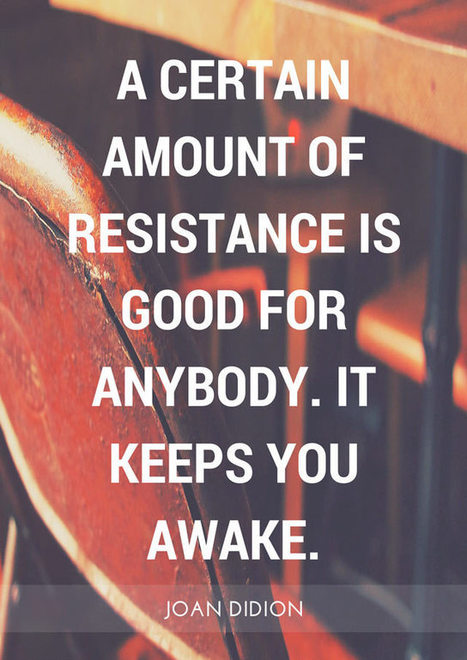

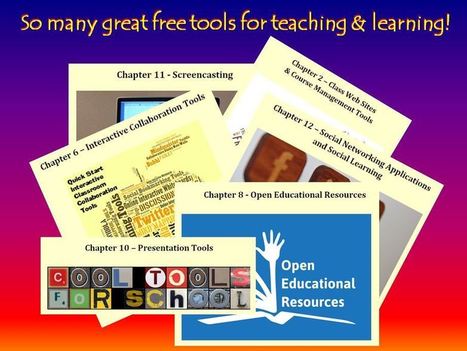



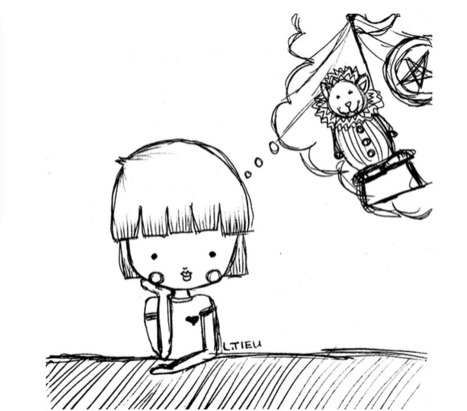
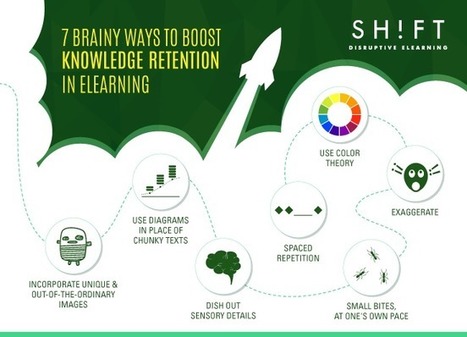
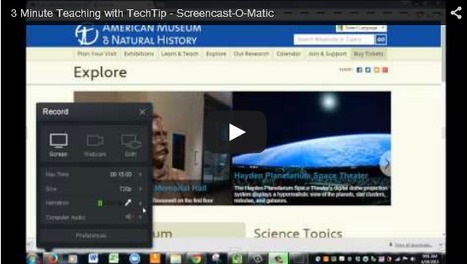
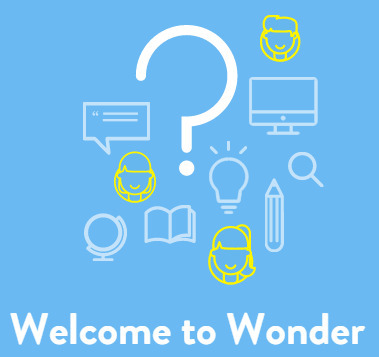
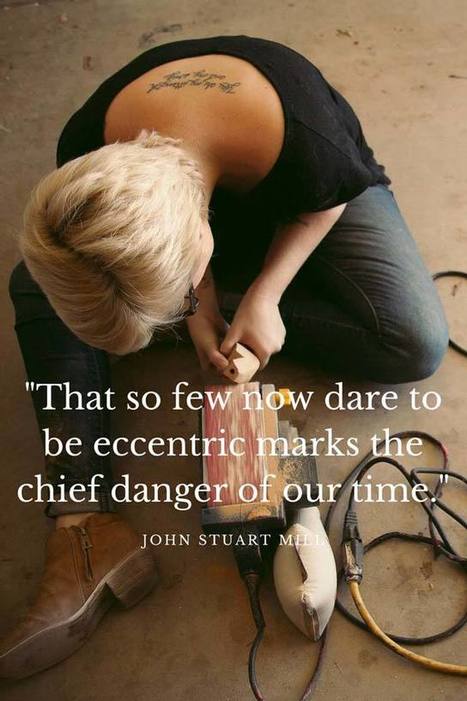

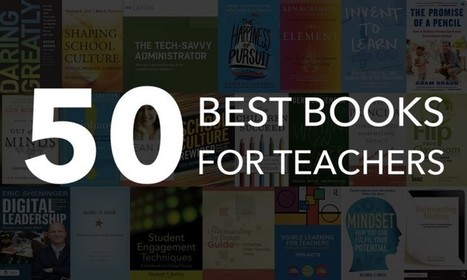
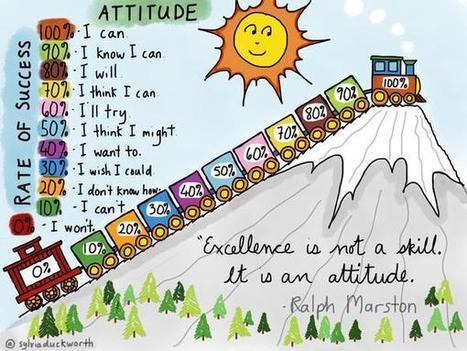


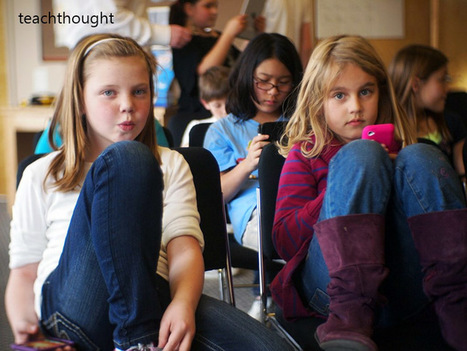
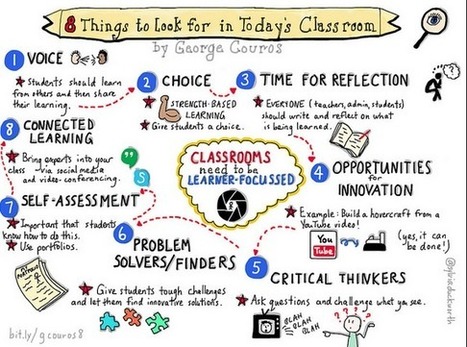

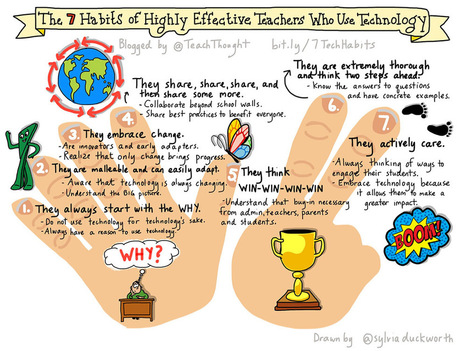
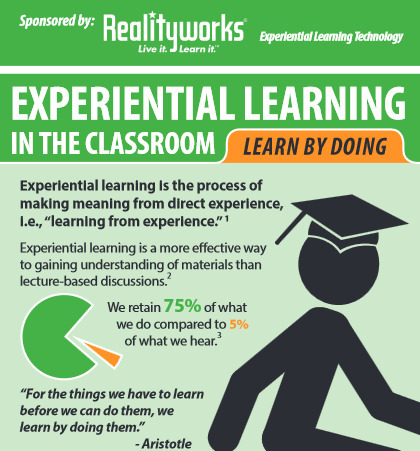
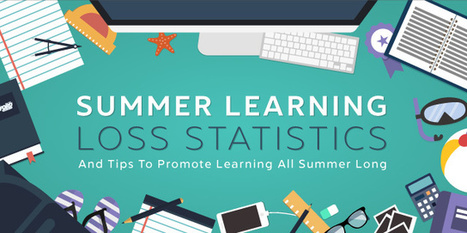

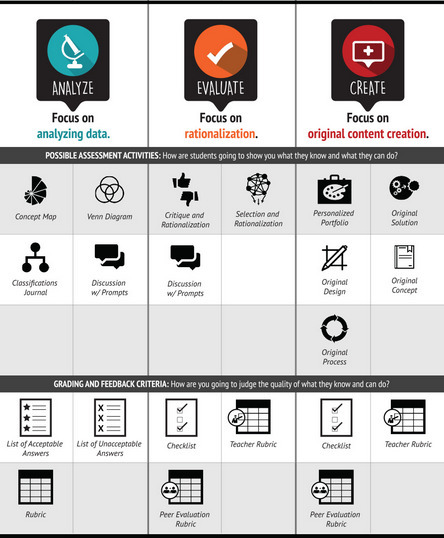

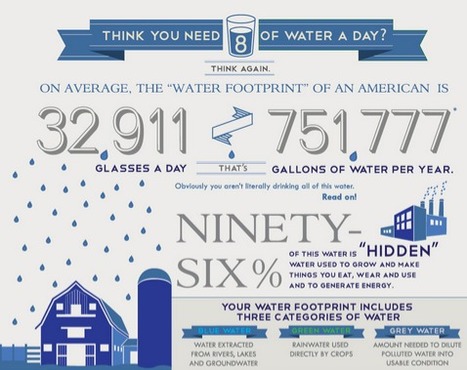
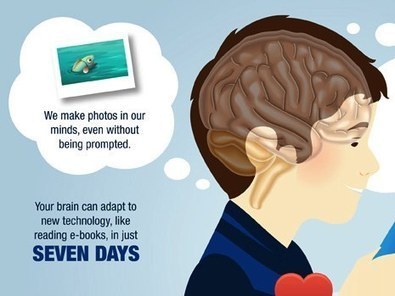
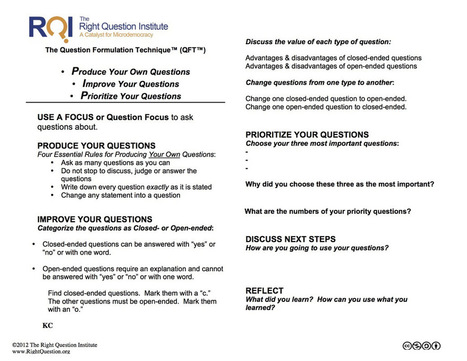
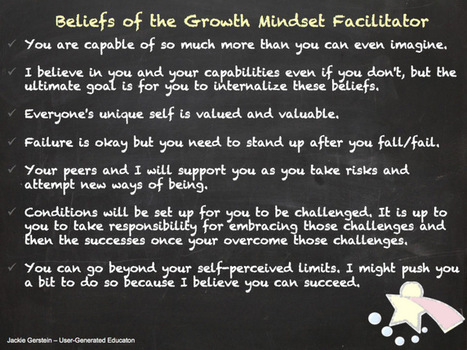
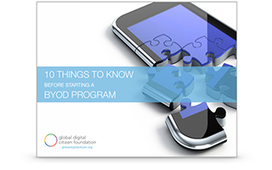





What is similar about all the situations mentioned above? In each, the individual was criticized, but they each moved on and became public figures who were incredibly successful. They learned from criticism.
This post explores criticism, sharing a section on how criticism originally focused on literary criticism, which was also at a time when many could not read or write, and tracing the history forward to today, where we often use the word feedback.
The post provides insight into why people often react negatively to criticism and then moves to ways to embrace criticism. Below are three examples from the post. More information on each is in the post as are additional ideas...and think about this as a type of mindset that may help our learners move forward.
* Be intellectually humble.
* Remember your own human tendency to criticize.
* Lower your defenses and take responsibility.